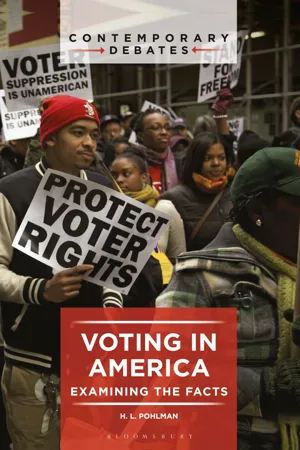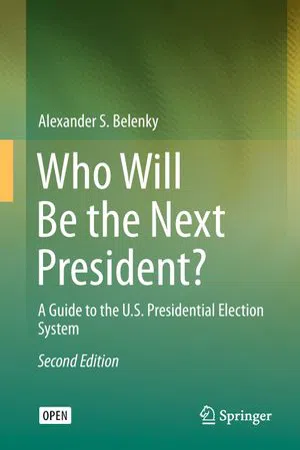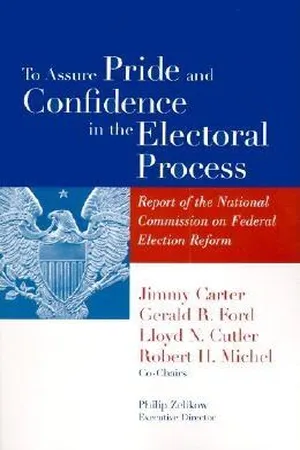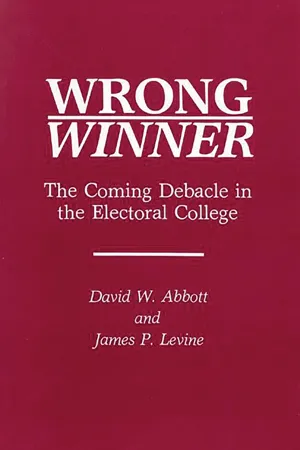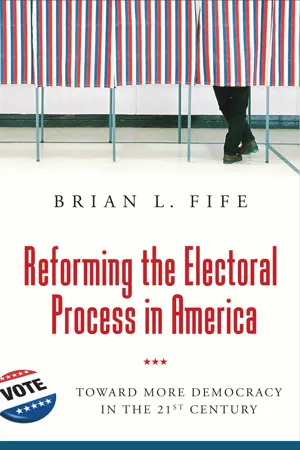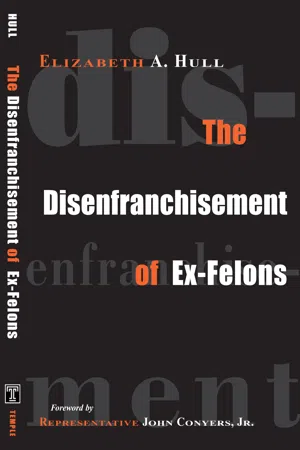Politics & International Relations
23rd Amendment
The 23rd Amendment to the United States Constitution, ratified in 1961, grants residents of Washington, D.C. the right to vote in presidential elections. Before the amendment, D.C. residents were unable to participate in the selection of the president and vice president. This amendment aimed to provide greater political representation for the residents of the nation's capital.
Written by Perlego with AI-assistance
Related key terms
1 of 5
6 Key excerpts on "23rd Amendment"
- eBook - ePub
Voting in America
Examining the Facts
- H. L. Pohlman(Author)
- 2020(Publication Date)
- ABC-CLIO(Publisher)
In this context, without a clear Democratic successor, Roosevelt decided that it was too dangerous to change leadership, so he ran for a third term in 1940 and a fourth in 1944, winning both. However, during the latter election, Republican candidate Thomas Dewey argued, “four terms of sixteen years is the most dangerous threat to our freedom ever proposed.” He added, “That is one reason why I believe that two terms must be established as the limit by constitutional amendment.” The Hoover Commission, created in 1947 by President Harry Truman (who succeeded Roosevelt after his death in 1945) to make administrative changes in the federal government, agreed with Dewey and recommended to Congress that it should submit such an amendment to the states. A Republican-controlled Congress did so in March 1947, and the requisite number of states ratified it in 1951. The amendment limited the number of years a president could serve to ten. Accordingly, if a person became president without a presidential election and served for less than two years, then he or she could run for two additional terms, but only for one term if his or her initial term of office was more than two years.The Twenty-Third Amendment gave the citizens of Washington, DC, the right to select the number of “electors” to the Electoral College in presidential elections to which it would be entitled if it was a state, but in no case more electors “than the least populous State.” Prior to this amendment, Congress under Article I, Section 8, of the Constitution had the power to “exercise exclusive Legislation in all Cases whatsoever, over such District … as may … become the Seat of the Government of the United States.” Washington, DC, became the “Seat of Government” in 1801, and from that point forward, Congress generally refused to delegate authority to elected local officials, especially after 1870, preferring instead to delegate to the President the power to appoint local DC officials and city council members. In 1881, an amendment to permit DC’s participation in presidential elections was introduced in Congress, but support for it was negligible. It was not until President Dwight D. Eisenhower endorsed the idea in the 1950s that momentum for such an amendment began to build. Congress passed the Twenty-Third Amendment in 1960 and both presidential candidates of that year, Vice President Richard M. Nixon and Senator John F. Kennedy, backed the measure. Thirty-eight states ratified the proposal by March 29, 1961.The 1964 presidential election was the first in which the citizens of DC were able to vote. Currently, the District has three electoral votes, the same number as Wyoming, the least populous state with approximately two hundred thousand fewer residents than Washington, DC. Although the Twenty-Third Amendment gave DC residents the right to participate in presidential elections, it did not give them the right to participate in congressional elections, whether of the Senate or the House of Representatives. However, in 1970, Congress granted the citizens of DC the right to vote for one nonvoting - Alexander S. Belenky(Author)
- 2016(Publication Date)
- Springer Open(Publisher)
Besides the considered situations, Amendment 25 determines the rules to be applied if either a President-elect or a Vice-President-elect makes an unexpected decision to resign before Inauguration Day. Also, Amendments 20 and 25 authorize Congress to provide for situations that may occur in the elections under certain tragic circumstances. The reader interested in studying such situations is referred to the book [4]. 2.7 Electoral Requirements and Amendments 13, 14, 15, 19, 24, and 26 The Thirteenth Amendment prohibited slavery in the United States of America, changed the composition of the American electorate and, consequently, the ap-portionment of the seats in the House of Representatives among the states. The Fourteenth Amendment guaranteed equal “ privileges or immunities ” and “ equal protection of the laws ” to all citizens of the United States of America. Also, it determined who cannot be a member of the Electoral College in any election year. The Fifteenth Amendment gave the right to vote to all U.S. citizens, indepen-dently of their “ race, color, or previous condition of servitude. ” The Nineteenth Amendment prohibited both the denial and the abridgment of the right to vote based on sex, giving American women the right to vote. The Twenty Fourth Amendment prohibited both the denial and the abridgment of the right to vote due to the failure to pay any taxes. 2.6 The Electoral College and Amendments 20, 22, 23, and 25 39 The Twenty Sixth Amendment gave the right to vote to all American citizens who have attained the age of 18. 2.8 American Beliefs About the Election System The Constitution does not address certain issues relating to the voting behavior of electors in the Electoral College. Nor does it address issues relating to nominating presidential and vice-presidential candidates.- No longer available |Learn more
To Assure Pride and Confidence in the Electoral Process
Report of the National Commission on Federal Election Reform
- Jimmy Carter, Gerald R. Ford, Lloyd N. Cutler, Robert H. Michel, Philip D. Zelikow(Authors)
- 2004(Publication Date)
- Brookings Institution Press(Publisher)
Congress also allows states to decide for themselves when an election may be held when a vacancy occurs or when, for some reason, a state fails to select a representative on election day. 93 Similarly, if a state fails to choose presidential electors on election day, Congress provides for them to be appointed as the legislature of the State may direct. 94 Presidential Counting Rules Under Article II, section 1, and the Twelfth Amendment to the Constitu-tion, the president and the vice president are to be elected by the electors from the states. Each state receives one elector for each senator and one elector for each representative to which that state is entitled. 95 Under the Twenty-third Amendment, the District of Columbia is entitled to the num-ber of electors it would receive were it a state up to the number that the least populous state receives. Congress has then by statute laid down how it will receive the electors' votes and how it will handle disputes. The Constitution gives state legislatures the authority to determine the manner of appointing the electors in the states. 96 Unlike with representa-tives, there is no general provision under which Congress can override state rules for appointing electors—states enjoy nearly plenary authority over the manner of appointment. 97 Congress has by statute, however, provided a safe harbor provision that applies in the event of a controversy or con-test concerning the appointment of a state's electors. 98 If a state has pro-vided before election day a method for the resolution of such a controversy, and if that method results in the naming of electors at least six days before the day electors are supposed to meet in each state to elect the president and vice president, then the naming of those electors will be conclusive in the event of further controversy. 99 The Twelfth Amendment establishes in detail the procedures for each state's electors to cast their votes. - eBook - PDF
Wrong Winner
The Coming Debacle in the Electoral College
- David W. Abbott, James P. Levine(Authors)
- 1991(Publication Date)
- Praeger(Publisher)
However, more fundamental defects in our presidential selec- tion method remained. The Twelfth Amendment cured a technical infirmity of the electoral college but left untouched the more serious maladies occasioned by indirect election of the presidency that have been described in the preceding chapters. If our early Letting the People Decide 117 politicians could alter the Constitution after onlyfifteenyears of bad experiences with it, surely the accumulated wisdom of the next 185 years ought to be sufficient impetus to spur more dramatic changes that strike at the roots of a woefully deficient system. It is time for the founder's folly to be undone. MODIFYING THE ELECTORAL COLLEGE In thefirsthalf of the eighteenth century, the states went a long way in the direction of democratizing the presidential selection system. The Constitution permits them to choose their electors in any manner they see fit, and at the outset of the republic a variety of methods were used, including selection by the state legislature. But by 1868 the states had moved to the current system of popular voting for electors on a winner-take-all basis. States have been reluctant to change unilaterally to a fairer system of dividing votes between winning and losing candidates for fear that giving up its bloc vote would reduce the state's power to influence the outcome in the electoral college and diminish the appeals that candidates would make to the states. Consequently, with the exception of Maine, which has adopted a district system (described below), states have made only very minor changes in their procedures for picking electors. Given the reluctance of the states to change their procedures, the main focus of attempts to change presidential election rules has been in Congress through the constitutional amendment process. Well over five hundred proposals, dating back to 1797, have been introduced to change the system; all have failed (apart from the Twelfth Amendment). - eBook - PDF
Reforming the Electoral Process in America
Toward More Democracy in the 21st Century
- Brian L. Fife(Author)
- 2010(Publication Date)
- Praeger(Publisher)
THE TWELFTH AMENDMENT The Twelfth Amendment provided several important provisions that were designed to mitigate the political controversies that occurred during the 1796 and 1800 elections: The electors shall meet in their respective states and vote by ballot for Presi- dent and Vice-President, one of whom, at least, shall not be an inhabitant of the THE ELECTORAL COLLEGE AND THE FRAMERS 73 same state with themselves; they shall name in their ballots the person voted for as President, and in distinct ballots the person voted for as Vice-President, and they shall make distinct lists of all persons voted for as President, and of all persons voted for as Vice-President, and of the number of votes for each, which lists they shall sign and certify, and transmit sealed to the seat of the government of the United States, directed to the President of the Senate; the President of the Senate shall, in the presence of the Senate and House of Rep- resentatives, open all the certificates and the votes shall then be counted; the person having the greatest number of votes for President, shall be the Presi- dent, if such number be a majority of the whole number of electors appointed; and if no person have such majority, then from the persons having the highest numbers not exceeding three on the list of those voted for as President, the House of Representatives shall choose immediately, by ballot, the President. But in choosing the President, the votes shall be taken by states, the represen- tation from each state having one vote; a quorum for this purpose shall consist of a member or members from two-thirds of the states, and a majority of all the states shall be necessary to a choice. And if the House of Representatives shall not choose a President whenever the right of choice shall devolve upon them, before the fourth day of March next following, then the Vice-President shall act as President, as in the case of the death or other constitutional disabil- ity of the President. - eBook - PDF
- Elizabeth Hull(Author)
- 2009(Publication Date)
- Temple University Press(Publisher)
The Twenty-Third Amendment granted even residents of the District of Columbia the right to choose presidential electors, and the Twenty-Fourth Amendment relieved voters of poll taxes. Even with these amendments, as recently as 1965 whole swaths of the American electorate were effectively prohibited from casting a ballot. In an effort to address that national shame, Congress in 1965 enacted the enormously important Voting Rights Act, discussed at length in the following chapter, which prohibits states and their subdivisions from adopting or maintaining electoral practices, such as grandfather clauses and literacy tests, that have the effect of ‘‘di-luting’’ minority votes. Since the passage of the Voting Rights Act, other federal mandates have also extended rights to citizens with disabilities and limited proficiency in English. 6 In a halting and centuries-long process, then, Americans have come to embrace the ideal of universal suffrage, with one exception: They continue to tolerate and even encourage laws prohibiting ex-felons from exercising their political rights. Two authorities 82 Chapter Eight conclude, in fact, that ‘‘rising incarceration rates may constitute a unique ‘democratic reversal,’ leading away from the universal trend towards franchise extension and the spread of democratic governance.’’ 7 Constitutional Considerations and Political Realities If Congress attempted to halt this ‘‘democratic reversal’’ by passing a statute re-enfranchising at least some ex-felons, the statute would, of course, be subject to judicial review, and whether federal courts would uphold it is anything but certain. Someone examining their relevant rulings—on voting rights in general, say, or on state versus federal authority to establish electoral qualifications—could as easily conclude one way as the other. Until the mid-1960s federal courts assumed that states were largely free to condition the franchise any way they saw fit.
Index pages curate the most relevant extracts from our library of academic textbooks. They’ve been created using an in-house natural language model (NLM), each adding context and meaning to key research topics.
